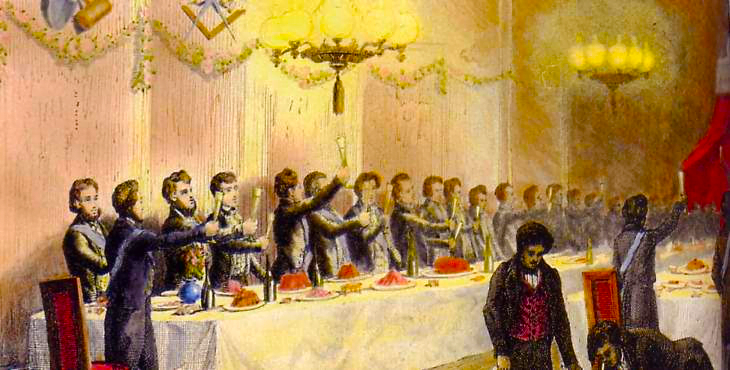By the Worshipful Master’s command I now present to you the Working Tools of the Social Mason. They are the Fork, Knife, and Tumbler.
The Fork is an implement by which even the most experienced Mason secure sometimes, by reaching across the table, the most delicate and succulent morsels which adorn our festive board to delight the eye and stimulate the jaded appetite.
It is further used to convey the various portions to the aperture which has been especially designed to receive them, and which reduces all nutrients to a common level. More especially should it be used when partaking of peas, for if conveyed to the mouth by the knife this vegetable globules may become rather elusive.
The Knife, when properly ground and sharpened, can be used to dissect the anatomy of the most venerable rooster, divide and prepare the same into proper portions to suit the aforementioned aperture, so that it may not be filled to excess, and thus prevent that frequent flow of eloquence which at all times is the special characteristic of a convivial Mason.
The Tumbler enables us with accuracy and precision to ascertain and determine the quantity of liquid which is most conducive to the preservation of our general joviality, and although the tumblers have not that mark known as a” pretty,” yet the skilled Craftsman can measure his tot by the two or three-fingered rule
But as we have not met as speculative, but rather as operative and energetic Masons, it is the moral conveyed in these emblems which we are most particularly requested to regard.
In this sense, the Fork points out that we should not at all times sit still and wait for that which we most desire, but should reach out, secure, and retain it, profiting by our opportunities and assimilating knowledge gained by our experience. Nor should we forget that the little things in life require to be looked after, lest they elude our grasp and be lost beyond recall, and as the prongs of the Fork are equal and mutually assist each other, being bound together in one complete structure, so we are all equal when met together as Masons.
The Fork should also teach us to stand shoulder to shoulder and practice those four qualities, which cannot be recommended too strongly to our notice -straightforwardness in all our dealings with one another, good temper in our differences of opinion, sympathy with the failings of a Brother, and fidelity to the sacred ties that bind us together.
The Knife teaches us the value of assiduity, for as it requires to be sharp and in good order to cope with some of the problems which confront it, so are we taught to take care of our mental and corporeal faculties, so that we may not be left behind in the battle of life. It further teaches us not to cut off more than we can comfortably chew, but to limit our desires in every stage of life so that rising to eminence by merit, we may live respected and die regretted.
The Tumbler inculcates the necessity for moderation in all things, for as it has no graduated scale by which to measure its varied contents, and the user must exercise his judgment as to the quantity of liquor poured therein, so we are expected to ascertain and not exceed the limits of our internal economy, and as the Tumbler will hold only a certain quantity without detriment to its surroundings, so we must learn our capacity, and thus avoid overflowing with untimely hilarity, or confusing our mental and physical powers.
Thus the W.T.’s of a convivial Mason teach us to bear in mind and act according to the cardinal virtues of prudence and temperance, so that when we are summoned to drink the Tyler’s toast after partaking of all the good things which a Bountiful Providence has provided for us, we may arise and depart homewards with the gratifying testimony of a contented mind, an equal poise, and a clear brain.
